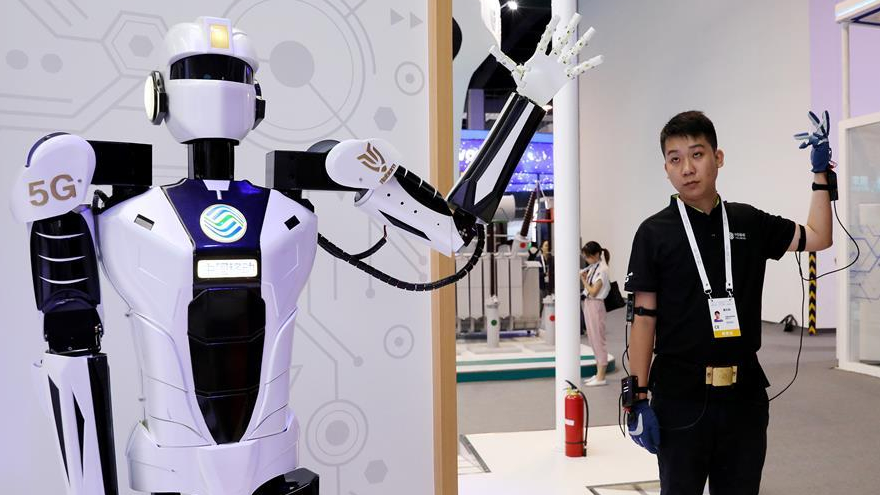
A staff member demonstrates 5G-based remote control of a robot during the 2019 World Artificial Intelligence Conference in east China's Shanghai, August 29, 2019. /Xinhua
A staff member demonstrates 5G-based remote control of a robot during the 2019 World Artificial Intelligence Conference in east China's Shanghai, August 29, 2019. /Xinhua
Editor’s Note: Sun Yang is an Associate Professor of China University of Political Science and Law. The article reflects the author's views, and not necessarily those of CGTN.
Imagine a machine that produces expressive work and proceeds to license the work to you. This is the social impact of innovative Artificial Intelligence technology. While human beings enjoy the convenience of advanced technology, the issue of AI authorship has undergone a sophisticated debate.
Stepping into the new century, Artificial Intelligence has evolved into a "3A-level" stage: automated, autonomous, and advanced technology. The operation of AI usually produces unpredictable work in the course of human-guide creation. A case in point is a robotic artist, named E-David, designed by the University of Konstanz in Germany. E-David uses a complex visual optimization algorithm to create paintings. E-David does not copy other paintings, but instead autonomously takes pictures with its camera and draws original paintings from these photographs. As a result, it produces new drawings in a non-anticipated and creative way.
The question remains whether an Artificial Intelligence, like E-David, should enjoy authorship like a traditional real artist. The copyright jurisprudence has long recognized the justification on authorship of natural artists. So long as an artist independently creates certain expressive work, he or she naturally is the author within the copyright system. The threshold of copyright authorship is known as originality, which merely demands the creative work should be original.
While some AI programmers and owners expect the authorship granted from copyright law, legal practice suggests opposing attitudes from judicial systems and administrative agencies. Recently, a civil court in Beijing judged an infringement case concerning the use of a piece of document created by AI software. The court ruled in favor of the defendant that the document was not copyrightable and thus no infringement occurred. Similarly, the U.S. Copyright Office manifests the rules on AI creation by rejecting any non-human creation on authorship, leaving both U.S. Congress and U.S. Supreme Court silent on this issue.
Theoretical justification of copyright jurisprudence determines the validity of authorship. Therefore, currently, the legal practice indicates the AI authorship must justify itself within the copyright system. Speaking of the justification on authorship, three main theories account for the query: the utilitarian theory, the personality theory, and the Locke's labor theory.
The utilitarian theory concentrates on the trade-off over costs and benefits. As to copyright system, the standard of rule and policy must weigh between the costs and benefits underlying copyright creation. Generally, artists as natural author highly value the royalties as benefits that would incentivize them to continue artistic creation. Lack of such benefits as effective incentives, artists may be reluctant to devote their genius contribution into societal prosperity. Under the circumstances, the incentives guarantee the rationale of utilitarian theory.

A visitor interacts with a cloud-based intelligent robot in Beijing, May 21, 2019. /Xinhua
A visitor interacts with a cloud-based intelligent robot in Beijing, May 21, 2019. /Xinhua
Artificial intelligence, to the contrary, does not rely on pecuniary incentives to run the system. Data, power, internet connection and initial order constitute a rough roadmap of an operating Artificial Intelligence. Since AI lacks of consciousness at this moment, the availability of incentives would trigger undesirable reluctance in creation like natural artist. The impact underlying utilitarian theory has been significantly weakened to the ground.
The personality theory originates from Continental Europe. The theory denies any non-human authorship in accordance with the human rights rationale. European scholars believe that only the "flash of genius" of human being accounts for civilization. It recognizes and appreciates the author's accomplishments and the element of his or her personality. Just as Artificial Intelligence does not need to be incentivized, the Al systems do not need the recognition of the works reflecting their personality.
Neither the utilitarianism nor the personality lays solid foundation for AI's authorship. Labor theory by British philosopher John Locke scrutinizes AI's labor and contribution. According to Locke's discourse, authorship is a kind of reward on human's intellectual labor. Unfortunately, AI is not human being. On the other hand, the justification of labor theory emphasizes on actual contribution of creation in exchange of rewards. Artificial Intelligence generally is designed and developed by programmers who substantially contributes to the innovation. Although some artistic creation by Advanced AI is self-driven, such creation does not equal to natural authors' contribution in jurisprudence.
The moment we understand how Artificial Intelligence works, the moment we realize that authorship is unprepared and irrelevant for current AI system. Technology has continued its forward march, yet our laws lag behind. Consequently, copyright law needs to be reassessed in order to determine the authorship of Artificial Intelligence.
(If you want to contribute and have specific expertise, please contact us at opinions@cgtn.com)